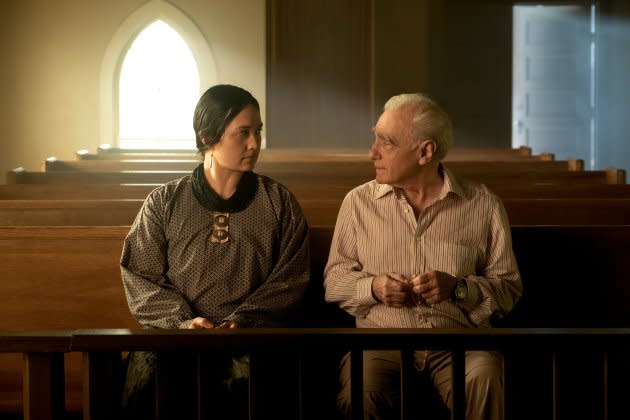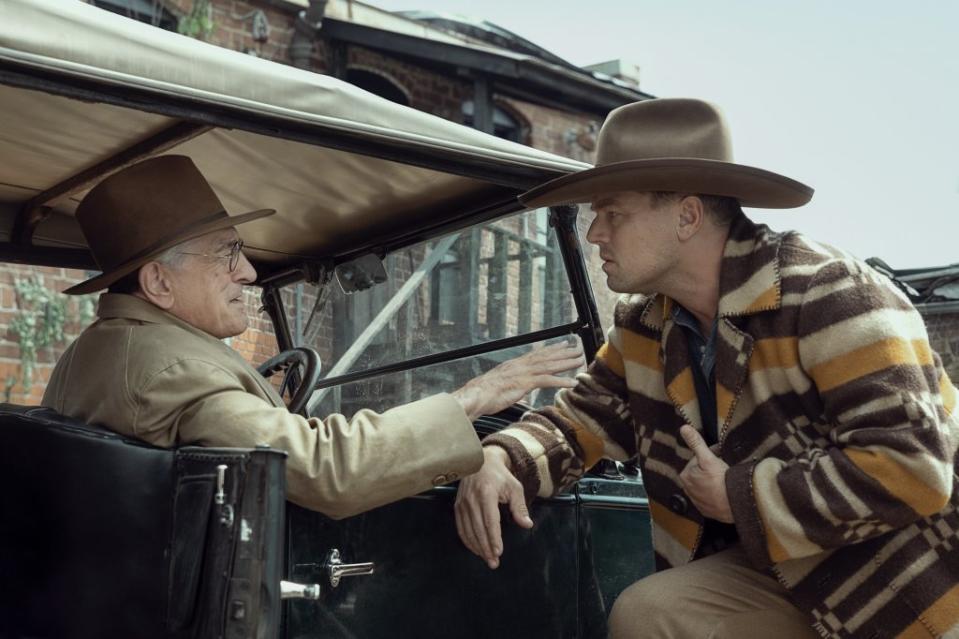
Whether Lily Gladstone decides to campaign for lead actress or supporting (and there’s a case for either), a spot will be reserved for her in a lineup. That’s because her powerfully complex role in Apple Original Films’ “Killers of the Flower Moon,” which debuted at the Cannes Film Festival on a rainy Saturday night, is too good to ignore.
Gladstone delivers an uncompromising portrayal as Mollie, an Indigenous woman whose family and tribal community are being murdered at the hands of a sinister group of white men, driven by their thirst for greed and power. She’s a magnificent force.
More from Variety
It became clear almost 10 minutes into Martin Scorsese’s epic adaptation of David Grann’s 2017 non-fiction book “Killers of the Flower Moon: The Osage Murders and the Birth of the FBI” that the audience of attendees were witnessing the birth of a star.
The film tells the tragic true story of members of the Osage tribe, who are murdered under mysterious circumstances during the 1920s. The events spark a major investigation that give birth to the FBI under the direction of J. Edgar Hoover.
At the center is Gladstone’s Mollie, along with her husband Ernest (played by a remarkable Leonardo DiCaprio) and his Uncle “King” (played by a visceral Robert DeNiro in his best performance in more than a decade).
When it comes to Gladstone, 36, the truth is she’s already demonstrated a remarkable range with an impressive body of work. Some of those include 2013’s “Jimmy P: Psychotherapy of Plain Indians” and 2020’s “First Cow.” In fact, I believe she should have already been the recipient of an Oscar statuette for supporting actress for her remarkable turn in Kelly Reichardt’s multi-narrative 2016 drama “Certain Women.”
Indigenous representation in the Academy (and Hollywood) has been virtually nonexistent in the history of cinema. Assuming supporting actress is in the cards for her (that’s where pundits including Variety have been tracking her), she would be only the second Indigenous actress ever nominated in the category after Jocelyne LaGarde for 1966’s “Hawaii.” It’s well overdue (and first ever winner perhaps?).

When it comes to Scorsese’s frequent collaborators — DiCaprio and DeNiro — expect to see them in the mix for another trip around the awards circuit.
DiCaprio, a best actor winner for “The Revenant,” has never played a character so grotesque. An actors branch favorite, if he were to be overlooked, it might be due to the vile nature of the real life man he portrays, which could turn off voters. It would have nothing to do with the quality.
The same goes for DeNiro, who chews up the scenery with a villainous twang, in his most terrifying turn since 1991’s “Cape Fear.” He’s a two time winner for “Raging Bull” (1980) and “The Godfather Part II” (1974). Much like Ralph Fiennes’ nominated turn as a Nazi commander in “Schindler’s List,” there is such a thing as being “too evil” for voters.
Jesse Plemons, who plays agent Tom White, is the leading character in the book. However, he takes a substantial backseat in the tale, and doesn’t have the screen time to pop (unless the Academy voters fall over themselves with nominations). The Oscar nominated actor of “The Power of the Dog” doesn’t show up on screen until nearly two and half hours into the tale. Last year’s best actor winner Brendan Fraser is only in the final 20 minutes or so.
Scorsese’s shot at walking away with his second Oscar for directing — after 2006’s best picture winner “The Departed” — have largely increased. At 80 years old, the auteur filmmaker, along with co-scribe Eric Roth, maneuver the difficult subject matter with respect. That will put them on the table for what is already looking like a jam-packed adapted screenplay race (coming after “The Zone of Interest”).
Rodrigo Prieto will be eyeballing his first win for cinematography after coming up short for “Brokeback Mountain,” “Silence” and “The Irishman.”
Three time winner and editing legend Thelma Schoonmaker will be an interesting part of the awards puzzle to watch closely. Based on initial reactions, even those who liked the movie were vocal about its robust runtime. She could be the “fault person” if that becomes an increasing consensus. For the moment, I feel the movie only works because of its epic scope, demanding the audience to witness the revolting horror of both physical, and cultural genocide that’s still occurring more than 500 years after Christopher Columbus stole America from its rightful inhabitants.
Best picture will be a viable option for the streamer. The greatest hurdle will be sustaining the buzz and noise for the next 10 grueling months.
No matter the outcome, Gladstone could (and should), at minimum, carry the Oscar torch for this impeccably moving motion picture.
Best of Variety
Sign up for Variety’s Newsletter. For the latest news, follow us on Facebook, Twitter, and Instagram.
Click here to read the full article.
